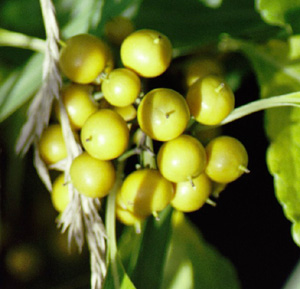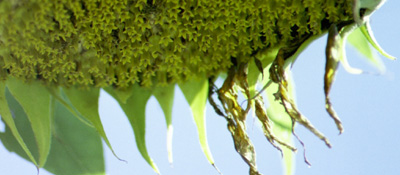
But "yellow" is no more yellow than "gelb," after all. It's a small miracle that "yellow" floods my mind's eye with, well, yellow. Just as "gelb" presumably floods Greta's eye with gelb. But there is something in it of the old question about the dog and Buddha Nature. Does a Jerusalem Artichoke have Yellow Nature ? Mu !

And, come to think of it, it's got an alias or two: girasole, earth apple. Girasole -- get it ? -- turns with the sun, sunflower. And, playing botanical charades, it sounds like Jerusalem.
And, I read, it has an edible, tuberous root. Like a potato. Like a pomme de terre.
And what about the ubiquitous, autumnal air potato ? As in Frost's poem ?
For I have had too much
Of apple-picking. I am overtired
Of the great harvest I myself desired.
There were ten thousand thousand fruit to touch,
Cherish in hand, lift down and not let fall.
Words, words words. Ten thousand thousand words. To touch, cherish and lift down onto the page. No wonder the poet is weary and has taken to staring at the hoary grass
...through a pane of glass
I skimmed this morning from the drinking trough

Consider two translations of Rilke's famous, autumnal poem from The Book of Hours
The first, Robert Bly's I think, begins
Already the ripening barberries are red
and the old asters hardly breathe in their beds
and ends with (you being God)
... And you are like a stone
that draws him daily deeper into the depths.
The language is simple, stately, anaphoric. The speaker describes the man who is not "rich" by harvest time, not full of a confident, vision-generating interior darkness. "No days open" to him and everything that does happen "cheats" him, "Even you, my God," prays the speaker.
But then the speaker calls God a "stone" "drawing" the unfulfilled old man "deeper into the depths" -- an image that is the mystical antithesis of the "God" who "cheats," the merely conceptual God, the idea of God.
The other translation begins
The red barberries are about to ripen,
the old chrysanthemums heave
and ends with the old man considering everything, "even you dear Lord," "blatant lies."
... And you become a stone
to him, one that drags him down.
Here the lie, the cheat, the conceptual "God" simply "drags him down." There is no implicit mystical movement in this translation as there seems to be in Bly's. Bly's uses the softer, gentler, less violent verb "draws." The heavy alliteration -- "draws him daily deeper into the depths" is like gravity; the man is drawn into the depths of himself by God that resides there, heavy as a stone. A mystic involution, involuntary. Even though "deeper into the depths" is annoyingly redundant, it makes its point.
"Drags" is a harsh verb. I picture someone sinking in water, drowning, pulled down by a stone.
And the last lines in German ?
Und wie ein Stein bist du
in tagliche in die Tiefe zieht.
I speak no German. My German dictionary makes my eyes cross -- all those strings of consonants and ie/ei words. But I extract several key words --
You stone
daily depth draw
...and can't help thinking that Bly has been more faithful to the text. Indeed, listen to the book's opening stanza via the second translator:
The clock has struck and nudges me
with clear metallic beats:
My senses tremble. I feel I am able --
and I tackle the day that greets.
How can I begin to enumerate the infelicities ? The worst is the overwhelmingly clumsy and unnatural "tackle the day that greets," obviously chosen to rhyme with "beats." The second line in German is "mit klarem, metallenem schlag." "Schlag" means blow or beat, and, since "pulschlag" is pulse beat, Rilke seems to have chosen it to imply human pulse or heart beat. So "beats" is a reasonable choice for translation. But it "sounds" wrong. At least to my ear. I think musical beats more than heartbeats, maybe resisting the anthropomorphized, pulsing clock that's rousing the speaker into sensibility.
Then take the last two lines:
mir zittern die Sinne. Ich fuhle: Ich kann --
und ich fasse den plastichen tag.
Where is "plastichen" in the translation ? And why didn't she chose "I can" instead of "I am able" ? Surely not for the silly off rhyme of tremble and able ! "I can" also has a nifty, built-in GMHopkins homage --
Not, I'll not, carrion comfort, Despair, not feast on thee;
Not untwist -- slack as they may be -- these last strands of man
In me or, most weary, cry I can no more . I can;
-- how could she have resisted it ? Is there really a "clock" (uhr) that "nudges" (stupsen) in line one -- Da neigt sich die Stunde und rührt mich an ? And what does babelfish, a useful albeit stupid machine, have to say about all this ? It's not clever enough to chose "beats" for its implied pulse, but it's more faithful to Rilke's images --
there the hour leans and touches me
with clear metallic impact
me the senses tremble. I feel: I can
-- and I seize the plastic day
-- a leaning, touching hour is not the same as a nudging clock.
This translator has attempted to preserve Rilke's rhyme and meter and sacrifices fidelity to his images to that end. Well, one's rhetorical allegiances must go somewhere, I suppose.

Words, words, words: our grand, imperfect harvest, the thorny thicket where I've lost my way. If mere naming is a slippery and fraught enterprise, how can translation ever hope to succeed ? Is God -- "God" -- a lie or a stone ? If I had no eyes, what would "yellow" or "gelb" be to me ? And what is the eye that can realize "God" ? Do I need a neurophysiologist or a priest ? A translator or a poet ?
Is "God" Father Son and Holy Spirit in the same way that a sunflower is yellow ?
And if I sit here long enough, eyelessly enough, until all vestiges of "God" and "gelb" (and "rough" and "tall" and "crucified") are burned away, then what ?
Enlightenment, the Kingdom or just some human sleep ?
No comments:
Post a Comment